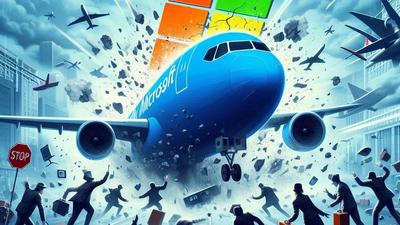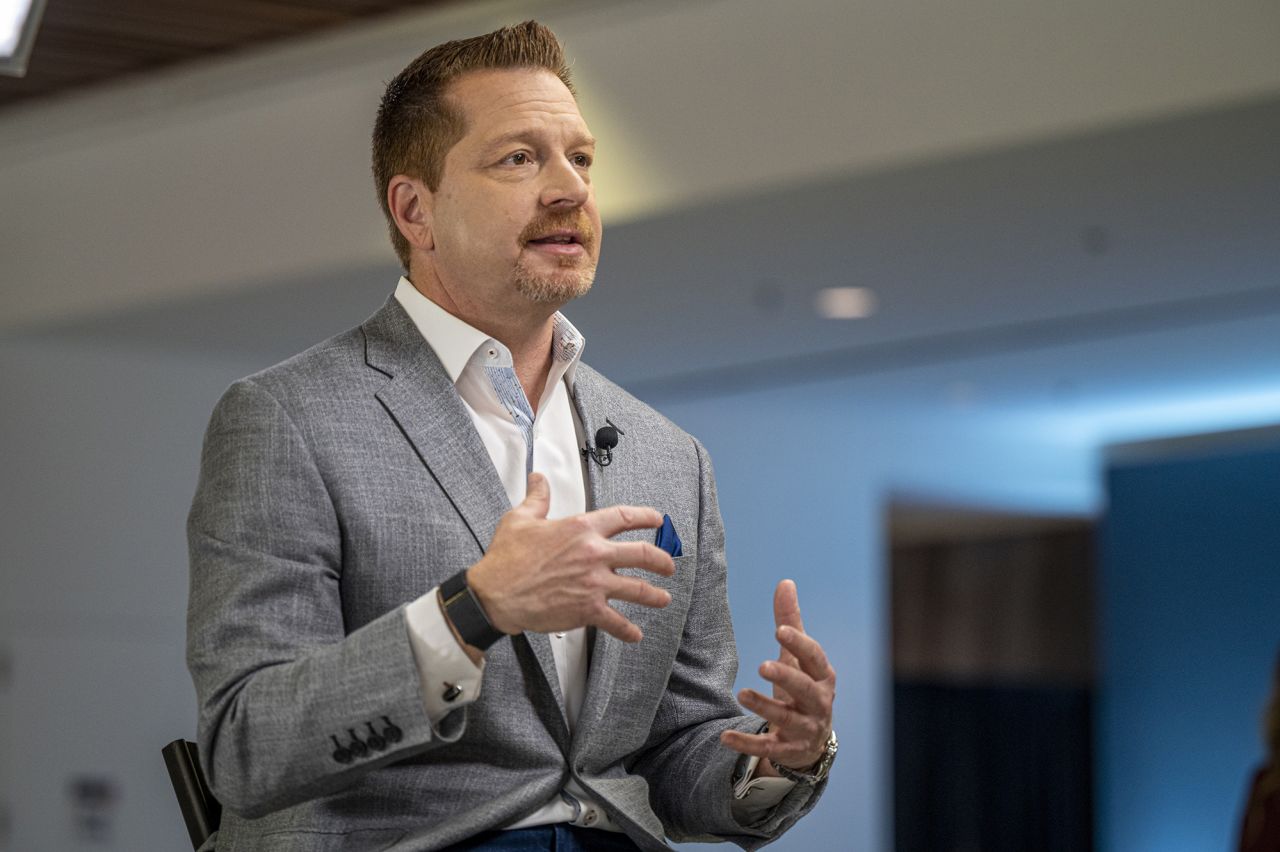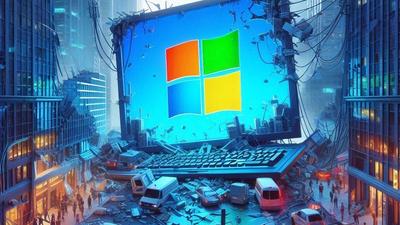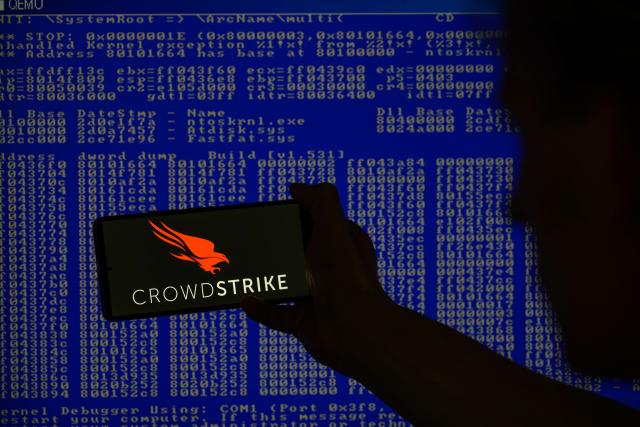Microsoft-CrowdStrike Pandemonium Causes ‘Largest IT Outage in History’; A Glimpse Of Our Technology’s Fragility And Its Potential To Revert Us To The Dark Ages

Early Friday, cybersecurity giant CrowdStrike experienced a significant disruption following an issue with a recent tech update, leading to a global outage.
Businesses worldwide struggled with the ongoing IT outage, which disrupted financial services, doctors’ offices, and even some TV broadcasters. Air travel was hit particularly hard, with planes grounded, services delayed, and airports issuing advisories to passengers.
CrowdStrike CEO George Kurtz stated that the company is “actively working with customers impacted by a defect found in a single content update for Windows hosts,” noting that Mac and Linux hosts were unaffected.
“This is not a security incident or cyberattack. The issue has been identified, isolated, and a fix has been deployed,” Kurtz announced on social media.
An expert suggested that this might be the “largest IT outage in history.”
The Fragility of Modern Technology
The recent CrowdStrike outage has laid bare the inherent fragility of the technological systems that underpin our modern world.
This incident, caused by a defect in a single content update, cascaded into a global IT outage that affected a myriad of sectors, from financial services and healthcare to media and air travel.
The event has spotlighted just how vulnerable our interconnected systems are to even the smallest disruptions.
The Illusion Of Robustness
Despite the technological advancements and the seemingly robust infrastructures that power our digital age, this outage reveals a disconcerting truth – our technology is much more fragile than we like to believe.
The global economy’s heavy reliance on technology means that a single point of failure can lead to widespread disruptions, as seen in financial services, for example.
These services rely on real-time data processing and communication; hence, when these systems fail, the repercussions are immediate and far-reaching, affecting everything from banking transactions to stock market operations.
The Risks of Monopoly
This global event has also shown us that the concentration of market power in a few dominant players can have far-reaching consequences and further aggravate this fragility.
Companies like CrowdStrike and Microsoft hold significant sway over the technological domain, making their systems critical to the operations of countless businesses and institutions worldwide.
Hence, when a single entity holds a significant share of the market, any disruption in its operations can have cascading effects, impacting a vast network of dependent systems and services, as seen yesterday.

The Perils Of Global Interconnectedness
Complicating matters more; our global interconnectedness, while a boon for efficiency and connectivity, also means that local issues can quickly escalate into international crises.
The CrowdStrike outage, initially a problem for Windows hosts, soon became a global issue affecting various sectors in different countries.
Thus, this interconnectedness means that no system operates in isolation; a glitch in one part of the world can lead to significant disruptions elsewhere.
Air travel, for instance, was severely impacted, with grounded planes and delayed services causing chaos for passengers worldwide.
Monopoly and Fragile Global Systems
As the world struggled with the outage, FTC Chair Lina Khan commented on the situation in a series of posts on X on Friday.
Without directly mentioning CrowdStrike or Microsoft, she appeared to attribute the outage to concentrated market power, which she argued creates “fragile systems.”
“Concentrating production can concentrate risk, so that a single natural disaster or disruption has cascading effects,” Khan wrote.
Although Khan did not announce an FTC investigation into the incident, she linked to past actions, including inquiries into cloud computing companies and seeking public comment on companies that frequently acquire smaller competitors, particularly in the technology sector.
Fire Fighting, CrowdStrike
In a blog post, CrowdStrike CEO George Kurtz apologized for the global outage and reiterated that his company is working closely with impacted customers and partners to restore all systems.
He encouraged customers to “remain vigilant” and engage with official CrowdStrike representatives for support.
“We know that adversaries and bad actors will try to exploit events like this,” Kurtz wrote.
He emphasized that the company’s blog and technical support portal will remain the official channels for updates.
Kurtz reiterated that the outage was caused by a defect in a Falcon content update for Windows hosts, and that Mac and Linux hosts were not impacted. He stressed once more that the outage was not due to a security breach or cyberattack.
“As we resolve this incident, you have my commitment to provide full transparency on how this occurred and the steps we’re taking to prevent anything like this from happening again,” he wrote.

The Impact Of Global Outage
Tesla Temporarily Halts Production
Electric vehicle maker Tesla temporarily halted production on some of its manufacturing lines on Friday following the unprecedented IT outage caused by system issues at cybersecurity firm CrowdStrike.
Tesla’s IT teams notified employees about a “Windows host outage” that affected various systems, including servers, laptops, and manufacturing devices. IT teams warned employees that they might encounter a “blue screen” on their devices.
Tesla CEO Elon Musk, who also owns the social media platform X, posted several complaints about the CrowdStrike outages to his account, which has more than 190 million followers, throughout the morning.
Two Tesla employees reported that some manufacturing lines were slow to start on Friday morning, and others were temporarily halted in California and Nevada. They also mentioned that managers were advising some workers to prepare for cancelled shifts or to go home early.
Business Insider, which first reported on the IT memo, wrote that workers at Tesla’s Texas vehicle assembly plant were sent home overnight in response to the outages.
Microsoft, a key Tesla vendor, scrambled to restore its apps and services on Friday morning. CEO Satya Nadella wrote in a statement on X that an update from CrowdStrike on Thursday had impacted global IT systems.
In replies to Nadella on X, Musk wrote that the outages had caused a “seizure” in the automotive supply chain, adding, “We just deleted CrowdStrike from all our systems, so no rollouts at all.”
Employees confirmed that Tesla was still using CrowdStrike as of Friday.
Tesla shares were down more than 3% in afternoon trading on Friday. The company did not immediately respond to a request for further information.

More Than 4,000 Flights Cancelled Globally Due to Outage
According to new data from aviation analytics firm Cirium released Friday, nearly 4% of all scheduled flights worldwide have been cancelled due to the disruption.
The firm reported that 4,295 flights had been canceled as of 12 p.m. ET.
According to Cirium, in the U.K., 4.6% of all scheduled departures, or 143 flights, have been canceled. Additionally, around 140 inbound arrivals have also been cancelled.
The global IT outage caused by a faulty update on Microsoft Windows led to widespread disarray at Delhi’s Indira Gandhi International (IGI) Airport.
Nearly 100 departing or arriving flights were canceled, and more than 300 were delayed, causing long queues and rampant confusion among passengers.
Chaos at IGI Airport in Delhi
The outage affected around 400 flights at IGI Airport in Delhi.
To manage the massive disruption, airline staff reverted to manual procedures reminiscent of the analogue days—they conducted manual check-ins, issued handwritten and stamped boarding passes, and shared flight updates with passengers using whiteboards and markers.
Airlines reported a massive cascade effect on operations at airports across the country, leading to flight delays, longer waiting times at counters and the grounding of dozens of flights throughout the day.
Major Indian airlines impacted by the outage included IndiGo, Akasa, SpiceJet, and Air India, with only manual check-ins being performed after 11 a.m., according to officials.
Lengthy queues were observed at both of IGI’s active terminals, T2 and T3, adding to the already heavy passenger load these terminals were handling, as Terminal 1 remains out of action following a roof collapse on June 28.
The Healthcare Sector Hit Hard
The healthcare sector also suffered significant disruptions.
Epic Systems, a healthcare software vendor that houses more than 305 million patient medical records, reported technical issues preventing some healthcare organizations from using its systems.
An Epic spokesperson mentioned that while the disruption did not directly affect the company’s services, it received reports of laptop and desktop workstations being down, as well as problems with data center software, preventing access to patient records through Epic.
Health systems across the U.S. faced outages, and England’s National Health Service (NHS) reported impacts on its system for booking doctors’ appointments and managing patient records, disrupting the majority of general practitioner practices.
The EMIS system, used by nearly 60% of England’s general practitioner practices, was affected, leading to manual operations from paper. Despite these challenges, the NHS stated that care was continuing as normal in most hospitals.
Logistics Sector Disruptions
Logistics companies also felt the brunt of the global tech outage.
FedEx reported experiencing “substantial disruptions” due to the outage, while UPS also reported an impact, according to statements from both companies.
The widespread effects of the outage underscore the vulnerabilities in our interconnected technological systems and the need for robust backup plans to mitigate such disruptions in the future.

CrowdStrike CEO: ‘We’re Deeply Sorry’
CrowdStrike CEO George Kurtz apologized on Friday for the systems update that caused a global IT outage, expressing his regret in an interview with NBC, saying, “We’re deeply sorry.”
Businesses are still struggling with the fallout, as many flights remain grounded and payment systems are down due to the cybersecurity giant’s antivirus software update malfunctioning.
“The system received an update that contained a software bug, which caused an issue with the Microsoft operating system,” Kurtz explained on NBC’s “Today.”
The CEO emphasized that this was not a security incident or cyberattack and assured that the company is actively working with customers to restore their systems.
He mentioned that the update was part of the firm’s routine process to prevent security risks. However, he acknowledged that a thorough investigation would be necessary to understand what went wrong.
“We need to go back and analyze what happened here. If there’s a negative interaction with the way some of these operating systems function—in this case, it was only a Microsoft operating system that was affected—you’ll see a reaction like this,” he said.

The Last Bit, The CrowdStrike outage shows us how shallow our technology’s robustness can be.
As we continue to advance technologically, it is equally crucial to recognize and address the vulnerabilities that come with our dependence on interconnected and concentrated systems.
Also, concentrating technology in the hands of a few in an increasingly interconnected world can be a dangerous bet; hence by reducing dependency on monopolistic structures, we can better prepare for and mitigate the impacts of future disruptions, ensuring that our technological pedestal remains stable and secure.




